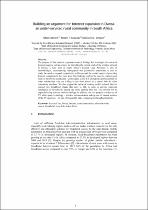 ResearchSpace
ResearchSpace
Building an argument for Internet expansion in Dwesa- an under-serviced rural community in South Africa
JavaScript is disabled for your browser. Some features of this site may not work without it.
- ResearchSpace
- →
- Research Publications/Outputs
- →
- Conference Publications
- →
- View Item
| dc.contributor.author |
Dlamini, Sifiso B

|
|
| dc.contributor.author |
Masonta, Moshe T

|
|
| dc.contributor.author |
Johnson, DL

|
|
| dc.date.accessioned | 2017-02-23T10:02:45Z | |
| dc.date.available | 2017-02-23T10:02:45Z | |
| dc.date.issued | 2014-11 | |
| dc.identifier.citation | Dlamini, S.V., Masonta, M.T. and Johnson, D.L. 2014. Building an argument for Internet expansion in Dwesa- an under-serviced rural community in South Africa. In: Africomm 2014: 6th International Conference on e-Infrastructure and e-Services for Developing Countries, Uganda, 24-27 November 2014 | en_US |
| dc.identifier.uri | http://hdl.handle.net/10204/8968 | |
| dc.description | Africomm 2014: 6th International Conference on e-Infrastructure and e-Services for Developing Countries, Uganda, 24-27 November 2014 | en_US |
| dc.description.abstract | The purpose of this paper is to present research findings that investigate the extent of Internet usage as well as options for extending the current reach of the wireless network in Dwesa, a rural area in South Africa’s Eastern Cape Province. A mix of methodologies, encompassing ethnographic and quantitative approaches, is used to study the need to expand connectivity in Dwesa and the social impact of providing Internet connection to this rural area. Our findings confirm the need to connect more areas of the Dwesa community - particularly active ICT champions and households of some stakeholders who are willing to use their homes as a central hub for other community members. We also suggest the option of running parallel network links to connect two broadband islands that exist in SLL in order to provide improved redundancy in the network, should one of the satellite links fail. The network will be expanded using wireless mesh technology. In addition, we also propose to make use of TV white space technology – wireless communication making use of unused portions of the TV spectrum – for one of the parallel links connecting the broadband islands. | en_US |
| dc.language.iso | en | en_US |
| dc.relation.ispartofseries | Wokflow;13871 | |
| dc.subject | Eastern Cape rural areas | en_US |
| dc.subject | Dwesa internet connection | en_US |
| dc.subject | Television white spaces | en_US |
| dc.subject | Siyakhula Living Lab | en_US |
| dc.title | Building an argument for Internet expansion in Dwesa- an under-serviced rural community in South Africa | en_US |
| dc.type | Conference Presentation | en_US |
| dc.identifier.apacitation | Dlamini, S. V., Masonta, M. T., & Johnson, D. (2014). Building an argument for Internet expansion in Dwesa- an under-serviced rural community in South Africa. http://hdl.handle.net/10204/8968 | en_ZA |
| dc.identifier.chicagocitation | Dlamini, Sabelo V, Moshe T Masonta, and DL Johnson. "Building an argument for Internet expansion in Dwesa- an under-serviced rural community in South Africa." (2014): http://hdl.handle.net/10204/8968 | en_ZA |
| dc.identifier.vancouvercitation | Dlamini SV, Masonta MT, Johnson D, Building an argument for Internet expansion in Dwesa- an under-serviced rural community in South Africa; 2014. http://hdl.handle.net/10204/8968 . | en_ZA |
| dc.identifier.ris | TY - Conference Presentation AU - Dlamini, Sabelo V AU - Masonta, Moshe T AU - Johnson, DL AB - The purpose of this paper is to present research findings that investigate the extent of Internet usage as well as options for extending the current reach of the wireless network in Dwesa, a rural area in South Africa’s Eastern Cape Province. A mix of methodologies, encompassing ethnographic and quantitative approaches, is used to study the need to expand connectivity in Dwesa and the social impact of providing Internet connection to this rural area. Our findings confirm the need to connect more areas of the Dwesa community - particularly active ICT champions and households of some stakeholders who are willing to use their homes as a central hub for other community members. We also suggest the option of running parallel network links to connect two broadband islands that exist in SLL in order to provide improved redundancy in the network, should one of the satellite links fail. The network will be expanded using wireless mesh technology. In addition, we also propose to make use of TV white space technology – wireless communication making use of unused portions of the TV spectrum – for one of the parallel links connecting the broadband islands. DA - 2014-11 DB - ResearchSpace DP - CSIR KW - Eastern Cape rural areas KW - Dwesa internet connection KW - Television white spaces KW - Siyakhula Living Lab LK - https://researchspace.csir.co.za PY - 2014 T1 - Building an argument for Internet expansion in Dwesa- an under-serviced rural community in South Africa TI - Building an argument for Internet expansion in Dwesa- an under-serviced rural community in South Africa UR - http://hdl.handle.net/10204/8968 ER - | en_ZA |





